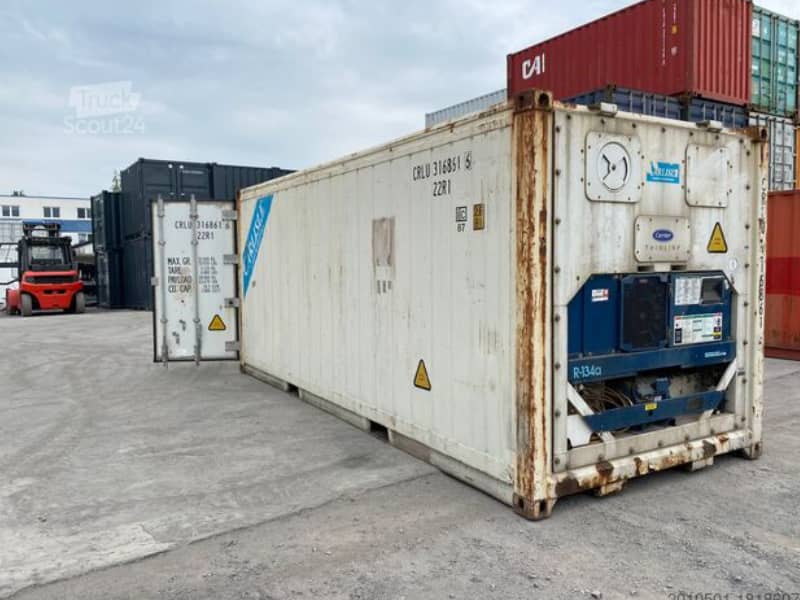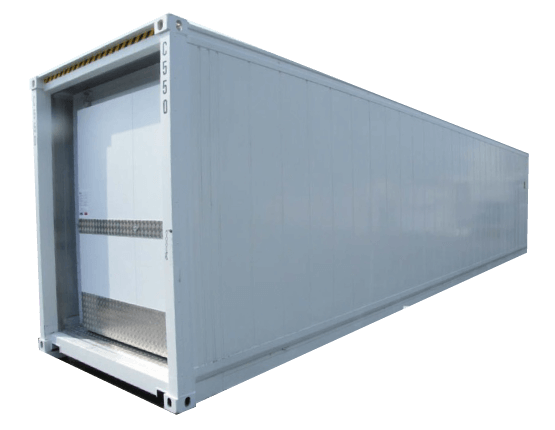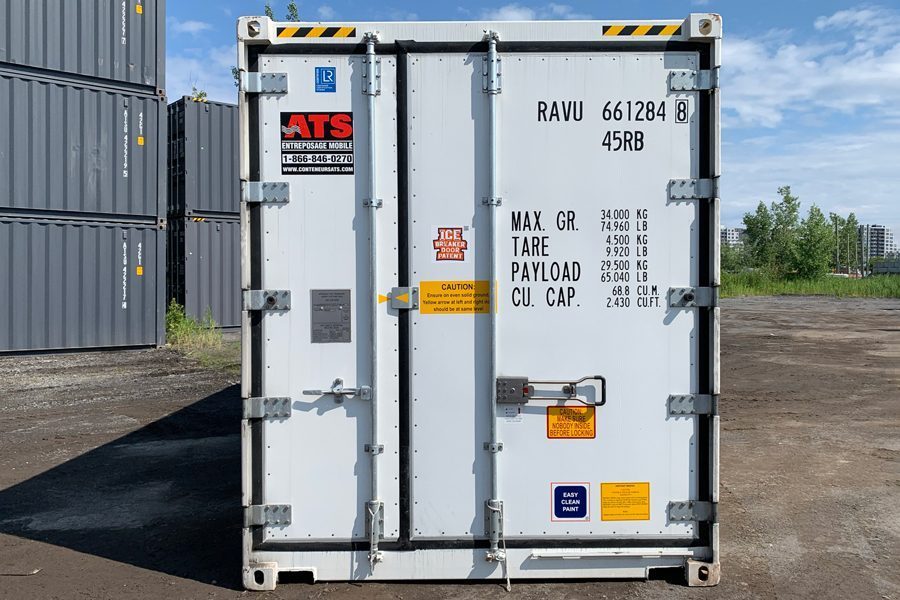All Regarding Cold Storage Containers: Vital Insights for Your Storage Requirements
Cold store containers play an important function in the preservation of subject to spoiling items. They can be found in numerous forms, consisting of cooled and protected units, each developed for details storage space demands. Understanding the benefits and key features of these containers is vital for organizations intending to enhance their operations. As the demand for reliable storage space options grows, checking out the various alternatives readily available can bring about informed decisions that impact both success and sustainability. What variables should one take into consideration when choosing the right container?
Sorts Of Freezer Containers
Cold storage containers come in various types, each designed to meet specific temperature control demands. Among the most typical types are refrigerated containers, which keep temperatures between 0 ° C to 10 ° C, making them appropriate for disposable products like fruits, vegetables, and dairy products. Another type is the deep fridge freezer container, which operates at temperatures listed below -18 ° C, ideal for long-term storage of frozen items such as meats and fish and shellfish.
Shielded containers provide temperature level security without active air conditioning, making them valuable for short-term transport of temperature-sensitive items. Additionally, there are portable freezer devices, which offer flexibility in areas and are often used in occasions or seasonal operations. Blast chillers rapidly decrease the temperature level of hot foods, guaranteeing safety and quality. Each kind offers a distinct function in different markets, from food service to pharmaceuticals, emphasizing the importance of selecting the ideal container for specific storage space needs.

Advantages of Utilizing Cold Storage Solutions

Chilly storage space solutions expand the shelf life of items, reducing waste and boosting earnings for businesses. By successfully handling inventory with proper temperature control, companies can optimize their supply chains and boost functional performance.
Furthermore, cold store centers enable for versatile storage choices, suiting numerous quantity demands and seasonal changes sought after (used 40ft refrigerated shipping containers). This adaptability assists organizations respond quickly to market modifications
Utilizing chilly storage services can guarantee conformity with health and safety regulations, safeguarding both businesses and customers. Overall, the tactical use freezer boosts item management while advertising sustainability and financial stability.
Trick Features to Search For in Freezer Containers
When selecting cool storage containers, numerous essential features benefit cautious factor to consider to protect peak performance and reliability. First, temperature level control abilities are essential; containers need to maintain consistent temperatures suitable for details products. Insulation high quality additionally plays a substantial function, as remarkable insulation lowers energy intake and improves temperature level stability.
Next off, ease of accessibility and loading is essential; containers must use user-friendly designs for efficient handling and company. Toughness is an additional vital aspect; weather-resistant materials assure long life and secure components versus environmental aspects.
Furthermore, flexibility features, such as built-in wheels or lifting factors, help with transportation, while personalized layouts enable customized storage solutions.
Finally, monitoring systems, consisting of temperature alarms and remote tracking, provide real-time updates, ensuring that conditions remain optimal. By concentrating on these functions, customers can choose freezer containers that satisfy their functional needs successfully.
Picking the Right Cold Storage Container for Your Needs
Picking the appropriate freezer container requires a thoughtful assessment of particular requirements and functional demands. Variables such as the sort of products being saved, temperature sensitivity, and volume ought to be focused on. For example, subject to spoiling food items might require containers with stringent temperature controls, while drugs might need specific conditions to maintain efficiency.
Furthermore, potential users ought to think about the container's size and flexibility. A larger system might be needed for bulk storage space, while smaller sized, mobile alternatives could be excellent for momentary or on-site needs. Insulation top quality and energy efficiency are also vital, as these will certainly affect operational costs and temperature stability.
Finally, conformity with industry policies and requirements is necessary, especially in markets like food and health care. By very carefully reviewing these aspects, users can pick a freezer container that effectively fulfills their unique demands and warranties ideal storage problems.
Best Practices for Keeping Cold Store Conditions
Preserving perfect freezer conditions is crucial for protecting the high quality and safety and security of temperature-sensitive items. Routinely keeping an eye on temperature level and moisture degrees is critical; making use of dependable electronic thermostats and hygrometers can provide accurate readings. In addition, correct insulation of cold store containers aids reduce temperature level changes and energy loss.
Applying a first-in, first-out (FIFO) system assures that older supply is used prior to more recent supply, decreasing waste (used 40ft refrigerated shipping containers). In addition, preserving an organized design within the storage space permits far better airflow and decreases the risk of cross-contamination
Regular upkeep checks on tools, such as compressors and seals, are essential to stop breakdowns. Personnel training on ideal methods for loading and dumping items helps maintain temperature level integrity. Keeping doors closed as much as possible limits warmth exchange, assuring that the cold storage environment remains secure and reliable in preserving useful items.
Cost Considerations for Cold Storage Space Solutions
When evaluating cool storage options, it is necessary to consider the first financial investment prices together with ongoing functional expenses. A thorough failure of these prices can expose significant long-lasting financial savings potential for companies. Recognizing these monetary facets assists stakeholders make educated choices concerning their freezer requirements.

Preliminary Investment Expenses
The economic landscape of freezer containers presents numerous preliminary financial investment costs that organizations have to consider. These costs normally consist of the acquisition or rental price of the containers, which can vary based upon dimension, kind, and insulation quality. In addition, costs associated to retrofitting existing frameworks to accommodate freezer has to be factored in, particularly if specialized tools is needed. Setup costs, consisting of electric job and refrigeration systems, likewise add to the overall preliminary investment. Services should not neglect transportation expenses for supplying containers to their desired area. Potential customization alternatives, such as shelving or temperature monitoring systems, can better impact the initial economic expense. Mindful budgeting for these elements is vital for successful cold store execution.
Functional Costs Malfunction
Operational expenses for cool storage solutions encompass several important expense factors to consider that services need to navigate. Secret elements consist of power costs, which can be substantial due to the demand to keep low temperatures. Upkeep costs are also substantial, as normal servicing is crucial to assure devices operates successfully and remains certified with health and security requirements. In addition, labor costs might arise from the demand for specialized team to handle and keep track of the storage atmosphere. Insurance policy costs are another factor to consider, as companies should secure their financial investments against prospective losses. Finally, any prospective regulative compliance expenses must be factored in, as organizations may require to buy systems that abide by food security and environmental laws. Comprehending these expenses is crucial for efficient budgeting.
Long-Term Financial Savings Possible
Buying freezer options supplies substantial long-lasting savings potential, transforming first expenses into monetary performance with time. By decreasing Read Full Article perishing and waste, organizations can enhance their revenue margins substantially. Advanced insulation and energy-efficient systems decrease energy costs, which accumulate over the life-span of the devices. Additionally, cold store containers usually need much less regular maintenance contrasted to conventional refrigeration methods, bring about reduced repair service costs. The capacity to store items for extensive durations without compromising top quality enables businesses to take advantage of market variations, maximizing revenue. Furthermore, the scalability of chilly storage redirected here options makes it possible for business to adjust to changing needs without incurring extreme costs. Overall, these factors add to an engaging instance for cold store as an affordable investment strategy.
Frequently Asked Inquiries
The Length Of Time Can Food Be Kept in Cold Store Containers?
The duration food can be stored in cool storage space containers differs by kind. Normally, perishable products last from days to weeks, while icy foods can remain risk-free for months, relying on appropriate temperature level and storage conditions.
Are Freezer Containers Energy-Efficient?
The energy efficiency of freezer containers differs based on style and insulation quality. Modern systems usually use sophisticated innovation to decrease power consumption, eventually adding to lowered functional prices and environmental influence in lasting use.
Can Freezer Containers Be Customized for Certain Demands?
Cold storage space containers can certainly be personalized to fulfill particular requirements. Adjustments might consist of temperature level controls, dimension changes, and additional functions, permitting customers to customize remedies successfully for numerous storage requirements and functional preferences.
What Are the Typical Dimensions of Cold Store Containers?
Freezer containers normally can be found in standard sizes such as 10, 20, and 40 feet. These dimensions fit different storage space needs, making sure adaptability for companies needing temperature-controlled atmospheres for subject to spoiling goods or delicate products.
Do Freezer Containers Require Special Licenses for Use?
Freezer containers frequently need unique permits for use, relying on local laws and meant applications. Authorities might mandate licenses to ensure security criteria, environmental compliance, and appropriate functional practices are maintained throughout their utilization.
Cold storage containers come in numerous kinds, each designed to fulfill specific temperature control demands. In addition, chilly storage facilities enable for flexible storage space choices, accommodating numerous quantity requirements and seasonal variations in need. Selecting the appropriate cold storage container calls for a thoughtful analysis of functional needs and certain demands. The financial landscape of cold storage containers presents various preliminary financial investment costs that services need to think discover this info here about. Cold storage space containers can indeed be tailored to satisfy specific needs.